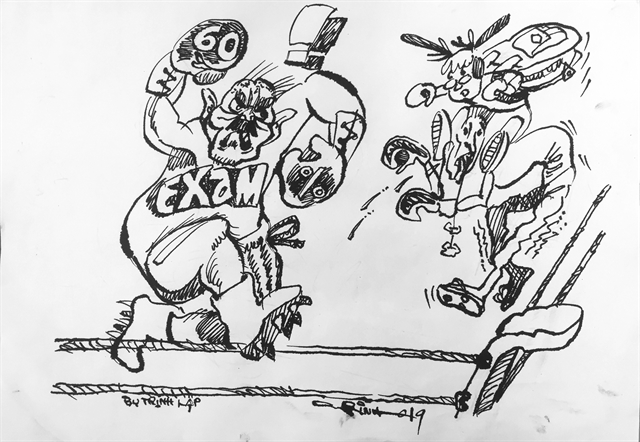
Illustration by Trịnh Lập
By Nguyễn Mỹ Hà
“Can you believe it, our Thăng Long (Ascending Dragon) has become Hạ Long (Descending Dragon)!” exclaimed one graduate of the school, one of the top public schools in Hà Nội.
This year, nearly 86,000 students had to sit for the entrance exam to get into the public high schools in the city. The accumulated scores of the previous years were not counted. Students must pass the exam to get a place at the city’s public high schools.
But the public schools can sit only 63,000 students at most, which means only 73 per cent of the city’s high school-age students will get a place to study. The rest can apply to private schools or vocational schools.
This makes the exam even more dreadful for students and places even heavier pressure on the parents.
“I’m here to apply for a reassessment or wait for the school to lower its pass scores,” said a mother. “I’ve requested annual leave from work to come here. My daughter dreams of getting into this school and she’s short by just half a point.”
Anxious parents waiting for their children at the testing points in the city have become a common sight every summer, during Hà Nội’s hottest month of June. While parents sweat outside the testing centres, students sweat inside, because most of the schools are not air-conditioned.
“In 38-40 degree Celsius heat, it’s hard to keep a cool head to perform your best. But as people say, when conditions are difficult, it’s difficult for everyone.”
Thăng Long High School has always been ranked among the city’s top schools along with the oldest Chu Văn An, Phan Đình Phùng or Kim Liên. Now, while the other schools maintain their pass scores at 48 marks and above, the score of Thăng Long dropped down to 30 marks.
“This is lowest in school’s history!” wrote one graduate with a sad face. “In the 1980s and 1990s, to get to Thăng Long was a source of pride!”
In Việt Nam, primary schools are supposedly mandated for everyone. Just this year, an exam to a specialized junior high school got 3,000 applications for only 100 places, meaning 30 students were fighting for one place.
Vietnamese parents are notorious for pushing for their children’s academic success. The race to get into this particular school mentioned above shows just the tip of the iceberg. School time usually lasts from 8am to 4.30pm, with extra classes to strengthen maths, computer skills, Vietnamese and English on offer. Because most parents cannot pick up their kids at 4.30pm, martial arts, dance and handicraft clubs are available to fill the gap.
“The news of Thăng Long lowering its score could be interpreted as positive news,” another commenter wrote. “It means less successful students now will have access to a better school with better teachers, so they can do better!”
“The access to education must be open to all,” an overseas Vietnamese, who graduated from a specialized school, commented.
“The Ministry of Education needs to eradicate all so-called specialized schools, which use tax-payers’ money to pay for only a group of a few excellent kids. Tax-payer money should be channelled to all the schools that need brighter classrooms, better desks and chairs, a computer room, a library, a piano, art supplies for a drawing room or a school small auditorium for performance art.”
According to some educators, because now students have more options to vie for specialized, public and even semi-public schools, top students may get more than one chance, while those who perform less well may have to wait longer to secure a place.
“Because Thăng Long was hard to get into, so many opted to switch to another school, where they believed they had more chances of getting in, that led to a drop in applications in the first place.”
“But be aware,” warned another, “next year, maybe it will rush right back to the top few because people will switch back.” VNS